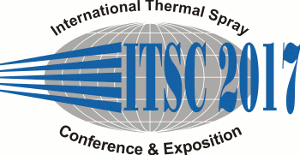
|
5357 |
|
Thursday, June 08, 2017, Hall 26 4:20 PM Wear & Corrosion Protection |
|
Impact of the stand-off distance and spray angle on the corrosion, cavitation and erosion behavior of thermal spray layers deposited by the three-cathode spraying
|
|
Marius Siebers* / Technical University Darmstadt, Germany Matthias Oechsner / Center for Engineering Materials, State Materials Testing Institute Darmstadt (MPA) Chair and Institute for Materials Technology (IfW), TU Darmstadt, Grafenstr. 2, 64283 Darmstadt, Germany Georg Andersohn/ Center for Engineering Materials, State Materials Testing Institute Darmstadt (MPA) Chair and Institute for Materials Technology (IfW), TU Darmstadt, Grafenstr. 2, 64283 Darmstadt, Germany Jörg Ellermeier/ Center for Engineering Materials, State Materials Testing Institute Darmstadt (MPA) Chair and Institute for Materials Technology (IfW), TU Darmstadt, Grafenstr. 2, 64283 Darmstadt, Germany Kirsten Bobzin/ Surface Engineering Institute, RWTH Aachen University, Kackertstr. 15, 52072 Aachen, Germany Lidong Zhao/ Surface Engineering Institute, RWTH Aachen University, Kackertstr. 15, 52072 Aachen, Germany Mehmet Öte/ Surface Engineering Institute, RWTH Aachen University, Kackertstr. 15, 52072 Aachen, Germany Tim Königstein/ Surface Engineering Institute, RWTH Aachen University, Kackertstr. 15, 52072 Aachen, Germany |
|
Fe-based coatings, such as novel FeCrMnBC alloy, have both economic and ecological advantages compared to other coatings like Ni-based or Co-based coatings. In recent years, high performance Fe-based wear and corrosion resistant coating systems have been developed. Some of them have even been introduced into the market. However, the suitability of the FeCrMnBC alloy as coating for cast iron under complex erosive and corrosive stresses in particle-loaded fluids for pump parts has not been investigated yet. Especially the impact of the process robustness of three-cathode plasma spraying coatings applied with variable process parameters like stand-off distance and spray angle is in the focus of interests. The objective of the present work has been the characterization of novel FeCrMnBC alloys, first time deposited via Thermal Spray processes. The corrosion resistances as well as the cavitation and erosion properties were separately evaluated by current density-potential measurements and supersonic cavitation in artificial sea water. Erosion corrosion behavior has been investigated in a pump test rig with 10 % by weight solids content of corundum (Al2O3). The results show that the reduction of spray angle and the variation of stand-off distance limited the corrosion and cavitation behavior in different ways. The erosion behavior shows only small variations for the tested parameters. The results reveal that the FeCrMnBC coatings exhibit high process robustness for the chosen parameter variations and a large potential to improve the protection of cast iron also for not optimized conditions. |